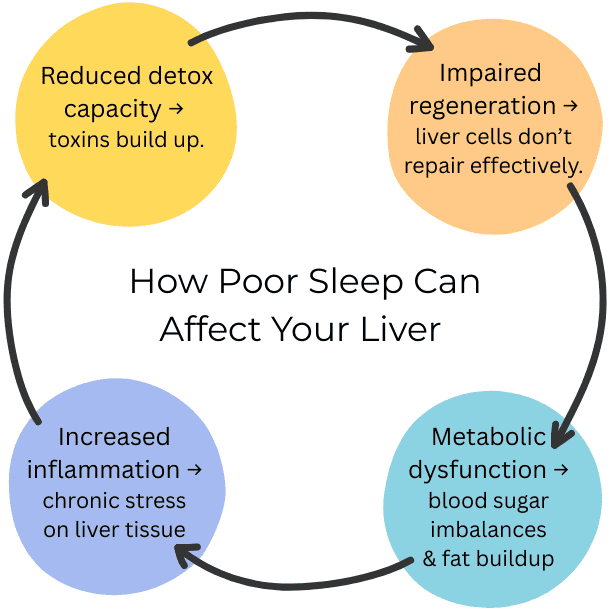Sleep and Liver Wellness: The Role of Quality Rest in Detoxification
Your liver operates on its own circadian rhythm, meaning its functionality varies throughout the day. Learn how sleep quality influences detoxification, regeneration, and metabolic balance, along with simple methods to enhance your liver’s natural timing for improved health.

Sleep and Your Liver: The Importance of Timing
Sleep does more than rejuvenate your mind; it also regulates essential liver functions. The liver has its own internal clock, synchronizing detoxification and repairs with your nightly rest. Just as you adhere to a daily rhythm, your liver has a circadian clock—a complete 24-hour cycle dictating when it performs various tasks. Recognizing this rhythm can reveal new approaches to support liver health and improve overall wellness.
Your liver doesn’t function uniformly throughout the day. It coordinates its most crucial activities with your body’s natural sleep-wake cycle. Disrupting this rhythm negatively affects your liver’s detoxification and regenerative capabilities.
Nighttime is the optimal period for your liver.
- 10 PM – 2 AM: Peak Detoxification. Detox enzymes are most active, eliminating toxins gathered during the day.
- 2 AM – 6 AM: Regeneration phase, when liver cells repair and renew.
- During the night, the liver also regulates blood sugar and fat metabolism.
- Important proteins essential for liver functionality are produced during deep sleep.
Lack of sufficient rest cuts these vital nighttime processes short.
Effects of Poor Sleep
Inadequate or irregular sleep disrupts your liver’s internal clock, leading to serious repercussions:

In essence, when your sleep quality falters, your liver health does too.
The Science Behind Liver Chronobiology (Full 24-Hour Rhythm)
Studies on chronobiology—the examination of internal biological clocks—indicate that the liver adheres to a structured 24-hour cycle. Different tasks take precedence at various times:
Morning (6 AM – Noon):
- Releases glucose from stored glycogen to energize your body after fasting overnight.
- Processes morning hormones like cortisol, which peaks early to increase alertness and energy.
- Begins metabolizing proteins and nutrients from breakfast.
Afternoon (Noon – 6 PM):
- Maximum bile production, aiding in the digestion of dietary fats.
- Manages nutrient metabolism (carbs, fats, and proteins) from afternoon meals.
- Continuously detoxifies caffeine, food remnants, and medications.
Evening (6 PM – 10 PM):
- Prepares for nighttime functions by activating detoxifying enzymes.
- Regulates blood sugar as evening meals conclude.
This phase also aids hormone regulation, such as insulin and melatonin, signaling your body to get ready for sleep.
Nighttime (10 PM – 2 AM): Peak Detoxification
- Detox enzymes work at their highest capacity, eliminating toxins collected throughout the day.
- The liver efficiently processes alcohol, medications, environmental toxins, and metabolic byproducts during this period.
Late Night (2 AM – 6 AM): Regeneration and Repair
- Liver cells regenerate and repair, preserving long-lasting organ functionality.
- Blood sugar and fat metabolism are recalibrated for the upcoming day.
- Essential proteins for liver and overall health are synthesized during deep sleep.
This cycle underscores the importance of sleep quality and timing.
Research Insights (and Limitations)
Studies published in The Journal of Hepatology and Gastroenterology confirm that the liver’s metabolic, detoxifying, and repair functions follow distinct circadian rhythms, peaking during specific phases of the day–night cycle.¹˒² While these studies don’t specify exact timing, they indicate two main activity peaks—one at the conclusion of daylight and another at the end of darkness—related to detoxification and repair. Many integrative health models connect these findings to roughly 10 PM–2 AM (detoxification) and 2 AM–6 AM (cellular repair and regeneration). This framework should be seen as an interpretation of circadian biology, not a direct quotation from the primary literature.
Enhancing Your Liver’s Rhythm
The encouraging news is that you can optimize liver performance by improving sleep habits and circadian health.
Sleep Timing
- Strive for bedtime between 10–11 PM to coincide with peak detox hours.
- Maintain consistent sleep/wake times to bolster your natural rhythm.
- Prioritize 7–9 hours of restorative sleep each night.
Enhancing Sleep Quality
- Ensure your sleep environment is dark and cool (65–68°F).
- Avoid screens for 2 hours before sleeping as blue light interferes with circadian signals.
- Refrain from eating late to allow your liver to focus on detoxification rather than digestion.
Nutrients for Circadian Support
- Melatonin – Regulates sleep-wake cycles.
- Magnesium – Promotes deep, restorative sleep.
- L-Theanine & GABA – Foster calmness and relaxation.
Liver-Specific Sleep Aids
- Milk Thistle – Protects liver cells during detoxification.
- NAC (N-Acetyl Cysteine) – Enhances glutathione for detox processes.
- B-Complex – Supports energy metabolism and circadian regulation.
Lifestyle Recommendations
- Morning light exposure to reset your biological clock.
- Bedtime rituals to signal your body (and liver) it’s time to rest.
- Stress management to mitigate cortisol-related disturbances in sleep and liver function.
- Regular physical activity to improve sleep and liver metabolism—just avoid exercising right before bedtime.
Smart Liver Sleep Strategies
Want to create the best conditions for your liver to function optimally? Implement these straightforward approaches:
- Go to bed by 10–11 PM to align with your liver’s detoxification phase.
- Stick to a regular schedule—your liver benefits from consistency.
- Maintain a cool, dark environment—ideal sleep temperature is 65–68°F.
- Avoid late-night snacks so your liver can concentrate on detox, not digestion.
- Wind down naturally—dim lights and limit screen time before sleep.
- Seek morning sunlight to align your circadian rhythm.
By enhancing your sleep, you simultaneously support your liver.
Final Thoughts
Your liver relies on sleep just as much as your brain and body do. By respecting your liver’s internal clock, you facilitate more effective detoxification, enhanced metabolic balance, and improved cellular repair.
Focusing on consistent, high-quality sleep equips your liver to detoxify, repair, and regulate metabolism—promoting your overall well-being.
Your liver operates on a circadian rhythm, affecting its detoxification and regeneration processes. Sleep significantly influences these functions, with peak detoxification occurring from 10 PM to 2 AM and regeneration from 2 AM to 6 AM. Disrupted sleep patterns can impair liver health, leading to serious consequences. To optimize liver function, prioritize quality sleep by going to bed by 10–11 PM, maintaining a consistent sleep schedule, and creating a conducive sleep environment (cool, dark, and screen-free). Supporting your liver through proper sleep habits is essential for effective detoxification and overall health.
Source link
